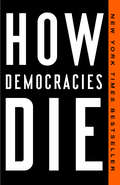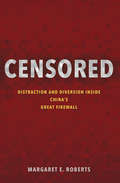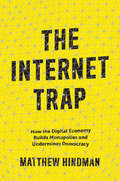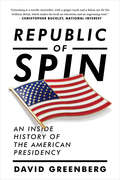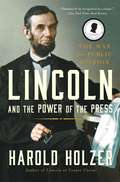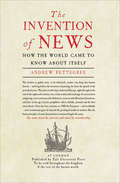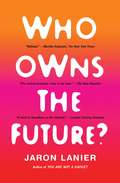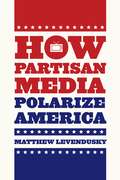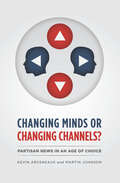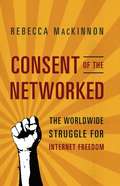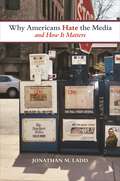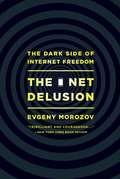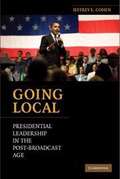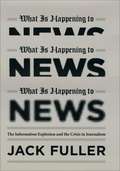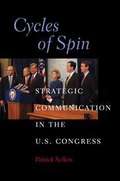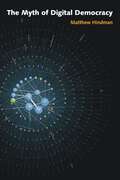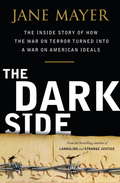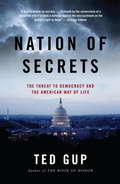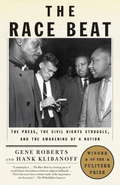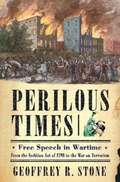Special Collections
Goldsmith Book Prize
Description: The Goldsmith Book Prize is awarded to the trade and academic book published in the last 24 months that best fulfills the objective of improving democratic governance by examining of the intersection between the media, politics and public policy. #award
- Table View
- List View
How Democracies Die
by Daniel Ziblatt and Steven LevitskyA bracing, revelatory look at the demise of liberal democracies around the world—and a road map for rescuing our own Donald Trump’s presidency has raised a question that many of us never thought we’d be asking: Is our democracy in danger?
Harvard professors Steven Levitsky and Daniel Ziblatt have spent more than twenty years studying the breakdown of democracies in Europe and Latin America, and they believe the answer is yes. Democracy no longer ends with a bang—in a revolution or military coup—but with a whimper: the slow, steady weakening of critical institutions, such as the judiciary and the press, and the gradual erosion of long-standing political norms.
The good news is that there are several exit ramps on the road to authoritarianism. The bad news is that, by electing Trump, we have already passed the first one. Drawing on decades of research and a wide range of historical and global examples, from 1930s Europe to contemporary Hungary, Turkey, and Venezuela, to the American South during Jim Crow, Levitsky and Ziblatt show how democracies die—and how ours can be saved.
A New York Times Bestseller
Censored
by Margaret E. RobertsA groundbreaking and surprising look at contemporary censorship in China
As authoritarian governments around the world develop sophisticated technologies for controlling information, many observers have predicted that these controls would be ineffective because they are easily thwarted and evaded by savvy Internet users. In Censored, Margaret Roberts demonstrates that even censorship that is easy to circumvent can still be enormously effective.
Taking advantage of digital data harvested from the Chinese Internet and leaks from China's Propaganda Department, this important book sheds light on how and when censorship influences the Chinese public.Roberts finds that much of censorship in China works not by making information impossible to access but by requiring those seeking information to spend extra time and money for access.
By inconveniencing users, censorship diverts the attention of citizens and powerfully shapes the spread of information. When Internet users notice blatant censorship, they are willing to compensate for better access.
But subtler censorship, such as burying search results or introducing distracting information on the web, is more effective because users are less aware of it. Roberts challenges the conventional wisdom that online censorship is undermined when it is incomplete and shows instead how censorship's porous nature is used strategically to divide the public.
Drawing parallels between censorship in China and the way information is manipulated in the United States and other democracies, Roberts reveals how Internet users are susceptible to control even in the most open societies. Demonstrating how censorship travels across countries and technologies, Censored gives an unprecedented view of how governments encroach on the media consumption of citizens.
The Internet Trap
by Matthew HindmanA book that challenges everything you thought you knew about the online economy
The internet was supposed to fragment audiences and make media monopolies impossible. Instead, behemoths like Google and Facebook now dominate the time we spend online—and grab all the profits from the attention economy.
The Internet Trap explains how this happened. This provocative and timely book sheds light on the stunning rise of the digital giants and the online struggles of nearly everyone else—and reveals what small players can do to survive in a game that is rigged against them.
Matthew Hindman shows how seemingly tiny advantages in attracting users can snowball over time. The internet has not reduced the cost of reaching audiences—it has merely shifted who pays and how. Challenging some of the most enduring myths of digital life, Hindman explains why the internet is not the postindustrial technology that has been sold to the public, how it has become mathematically impossible for grad students in a garage to beat Google, and why net neutrality alone is no guarantee of an open internet.
He also explains why the challenges for local digital news outlets and other small players are worse than they appear and demonstrates what it really takes to grow a digital audience and stay alive in today’s online economy.
The Internet Trap shows why, even on the internet, there is still no such thing as a free audience.
Republic of Spin
by David Greenberg
In Republic of Spin—a vibrant history covering more than one hundred years of politics—presidential historian David Greenberg recounts the rise of the White House spin machine, from Teddy Roosevelt to Barack Obama. His sweeping, startling narrative takes us behind the scenes to see how the tools and techniques of image making and message craft work. We meet Woodrow Wilson convening the first White House press conference, Franklin Roosevelt huddling with his private pollsters, Ronald Reagan’s aides crafting his nightly news sound bites, and George W. Bush staging his “Mission Accomplished” photo-op. We meet, too, the backstage visionaries who pioneered new ways of gauging public opinion and mastering the media—figures like George Cortelyou, TR’s brilliantly efficient press manager; 1920s ad whiz Bruce Barton; Robert Montgomery, Dwight Eisenhower’s canny TV coach; and of course the key spinmeisters of our own times, from Roger Ailes to David Axelrod.
Greenberg also examines the profound debates Americans have waged over the effect of spin on our politics. Does spin help our leaders manipulate the citizenry? Or does it allow them to engage us more fully in the democratic project? Exploring the ideas of the century’s most incisive political critics, from Walter Lippmann and H. L. Mencken to Hannah Arendt and Stephen Colbert, Republic of Spin illuminates both the power of spin and its limitations—its capacity not only to mislead but also to lead.
Democracy’s Detectives
by James T. HamiltonInvestigative journalism holds democracies and individuals accountable to the public. But important stories are going untold as news outlets shy away from the expense of watchdog reporting. Computational journalism, using digital records and data-mining algorithms, promises to lower the cost and increase demand among readers, James Hamilton shows.
Lincoln and the Power of the Press
by Harold HolzerFrom his earliest days, Lincoln devoured newspapers. As he started out in politics he wrote editorials and letters to argue his case. He spoke to the public directly through the press. He even bought a German-language newspaper to appeal to that growing electorate in his state. Lincoln alternately pampered, battled, and manipulated the three most powerful publishers of the day: Horace Greeley of the New York Tribune, James Gordon Bennett of the New York Herald, and Henry Raymond of the New York Times.
When war broke out and the nation was tearing itself apart, Lincoln authorized the most widespread censorship in the nation's history, closing down papers that were "disloyal" and even jailing or exiling editors who opposed enlistment or sympathized with secession. The telegraph, the new invention that made instant reporting possible, was moved to the office of Secretary of War Stanton to deny it to unfriendly newsmen.
Holzer shows us an activist Lincoln through journalists who covered him from his start through to the night of his assassination--when one reporter ran to the box where Lincoln was shot and emerged to write the story covered with blood. In a wholly original way, Holzer shows us politicized newspaper editors battling for power, and a masterly president using the press to speak directly to the people and shape the nation.
Political Journalism in Comparative Perspective
by Erik Albæk Arjen van Dalen Nael Jebril Claes H. de Vreese and Erik Albæk and Arjen Van Dalen and Nael Jebril and Claes H. de VreesePolitical journalism is often under fire. Conventional wisdom and much scholarly research suggest that journalists are cynics and political pundits. Political news is void of substance and overly focused on strategy and persons. Citizens do not learn from the news, are politically cynical, and are dissatisfied with the media. This book challenges these assumptions, which are often based on single-country studies with limited empirical observations about the relation between news production, content, and journalism's effects. Based on interviews with journalists, a systematic content analysis of political news, and panel survey data in different countries, this book tests how different systems and media-politics relations condition the contents of political news. It shows how different content creates different effects, and demonstrates that under the right circumstances citizens learn from political news, do not become cynical, and are satisfied with political journalism.
The Invention of News
by Andrew Pettegree&“A fascinating account of the gathering and dissemination of news from the end of the Middle Ages to the French Revolution&” and the rise of the newspaper (Glenn Altschuler, The Huffington Post). Long before the invention of printing, let alone the daily newspaper, people wanted to stay informed. In the pre-industrial era, news was mostly shared through gossip, sermons, and proclamations. The age of print brought pamphlets, ballads, and the first news-sheets. In this groundbreaking history, renowned historian Andrew Pettegree tracks the evolution of news in ten countries over the course of four centuries, examining the impact of news media on contemporary events and the lives of an ever-more-informed public. The Invention of News sheds light on who controlled the news and who reported it; the use of news as a tool of political protest and religious reform; issues of privacy and titillation; the persistent need for news to be current and for journalists to be trustworthy; and people&’s changing sense of themselves and their communities as they experienced newly opened windows on the world. &“This expansive view of news and how it reached people will be fascinating to readers interested in communication and cultural history.&” —Library Journal (starred review)
Media Commercialization and Authoritarian Rule in China
by Daniela StockmannIn most liberal democracies commercialized media is taken for granted, but in many authoritarian regimes the introduction of market forces in the media represents a radical break from the past with uncertain political and social implications. In Media Commercialization and Authoritarian Rule in China, Daniela Stockmann argues that the consequences of media marketization depend on the institutional design of the state. In one-party regimes such as China, market-based media promote regime stability rather than destabilizing authoritarianism or bringing about democracy. By analyzing the Chinese media, Stockmann ties trends of market liberalism in China to other authoritarian regimes in the Middle East, North Africa, sub-Saharan Africa, and the post-Soviet region. Drawing on in-depth interviews with Chinese journalists and propaganda officials as well as more than 2,000 newspaper articles, experiments, and public opinion data sets, this book links censorship among journalists with patterns of media consumption and media's effects on public opinion.
Who Owns the Future?
by Jaron LanierJaron Lanier is the father of virtual reality and one of the world's most brilliant thinkers. Who Owns the Future? is his visionary reckoning with the most urgent economic and social trend of our age: the poisonous concentration of money and power in our digital networks. Lanier has predicted how technology will transform our humanity for decades, and his insight has never been more urgently needed. He shows how Siren Servers, which exploit big data and the free sharing of information, led our economy into recession, imperiled personal privacy, and hollowed out the middle class. The networks that define our world--including social media, financial institutions, and intelligence agencies--now threaten to destroy it. But there is an alternative. In this provocative, poetic, and deeply humane book, Lanier charts a path toward a brighter future: an information economy that rewards ordinary people for what they do and share on the web. grow. It is time for ordinary people to be rewarded for what they do and share on the web. Insightful, original, and provocative, Who Owns the Future? is necessary reading for everyone who lives a part of their lives online.
How Partisan Media Polarize America
by Matthew LevenduskyForty years ago, viewers who wanted to watch the news could only choose from among the major broadcast networks, all of which presented the same news without any particular point of view. Today we have a much broader array of choices, including cable channels offering a partisan take. With partisan programs gaining in popularity, some argue that they are polarizing American politics, while others counter that only a tiny portion of the population watches such programs and that their viewers tend to already hold similar beliefs.
In How Partisan Media Polarize America, Matthew Levendusky confirms--but also qualifies--both of these claims. Drawing on experiments and survey data, he shows that Americans who watch partisan programming do become more certain of their beliefs and less willing to weigh the merits of opposing views or to compromise. And while only a small segment of the American population watches partisan media programs, those who do tend to be more politically engaged, and their effects on national politics are therefore far-reaching.
< In a time when politics seem doomed to partisan discord, How Partisan Media Polarize America offers a much-needed clarification of the role partisan media might play.
Changing Minds or Changing Channels?
by Martin Johnson and Kevin ArceneauxWe live in an age of media saturation, where with a few clicks of the remote--or mouse--we can tune in to programming where the facts fit our ideological predispositions. But what are the political consequences of this vast landscape of media choice?
Partisan news has been roundly castigated for reinforcing prior beliefs and contributing to the highly polarized political environment we have today, but there is little evidence to support this claim, and much of what we know about the impact of news media come from studies that were conducted at a time when viewers chose from among six channels rather than scores.
Through a series of innovative experiments, Kevin Arceneaux and Martin Johnson show that such criticism is unfounded. Americans who watch cable news are already polarized, and their exposure to partisan programming of their choice has little influence on their political positions. In fact, the opposite is true: viewers become more polarized when forced to watch programming that opposes their beliefs.
A much more troubling consequence of the ever-expanding media environment, the authors show, is that it has allowed people to tune out the news: the four top-rated partisan news programs draw a mere three percent of the total number of people watching television.
Overturning much of the conventional wisdom, "Changing Minds or Changing Channels?" demonstrate that the strong effects of media exposure found in past research are simply not applicable in today's more saturated media landscape.
Consent of the Networked
by Rebecca MackinnonThe Internet was going to liberate us, but in truth it has not. For every story about the web's empowering role in events such as the Arab Spring, there are many more about the quiet corrosion of civil liberties by companies and governments using the same digital technologies we have come to depend upon.
Sudden changes in Facebook's features and privacy settings have exposed identities of protestors to police in Egypt and Iran. Apple removes politically controversial apps at the behest of governments as well as for its own commercial reasons. Dozens of Western companies sell surveillance technology to dictatorships around the world.
Google struggles with censorship demands from governments in a range of countries--many of them democracies--as well as mounting public concern over the vast quantities of information it collects about its users.
In Consent of the Networked, journalist and Internet policy specialist Rebecca MacKinnon argues that it is time to fight for our rights before they are sold, legislated, programmed, and engineered away. Every day, the corporate sovereigns of cyberspace make decisions that affect our physical freedom--but without our consent.
Yet the traditional solution to unaccountable corporate behavior--government regulation--cannot stop the abuse of digital power on its own, and sometimes even contributes to it.
A clarion call to action, Consent of the Networked shows that it is time to stop arguing over whether the Internet empowers people, and address the urgent question of how technology should be governed to support the rights and liberties of users around the world.
Why Americans Hate the Media and How It Matters
by Jonathan M. LaddAs recently as the early 1970s, the news media was one of the most respected institutions in the United States. Yet by the 1990s, this trust had all but evaporated. Why has confidence in the press declined so dramatically over the past 40 years? And has this change shaped the public's political behavior? This book examines waning public trust in the institutional news media within the context of the American political system and looks at how this lack of confidence has altered the ways people acquire political information and form electoral preferences. Jonathan Ladd argues that in the 1950s, '60s, and early '70s, competition in American party politics and the media industry reached historic lows. When competition later intensified in both of these realms, the public's distrust of the institutional media grew, leading the public to resist the mainstream press's information about policy outcomes and turn toward alternative partisan media outlets. As a result, public beliefs and voting behavior are now increasingly shaped by partisan predispositions. Ladd contends that it is not realistic or desirable to suppress party and media competition to the levels of the mid-twentieth century; rather, in the contemporary media environment, new ways to augment the public's knowledgeability and responsiveness must be explored. Drawing on historical evidence, experiments, and public opinion surveys, this book shows that in a world of endless news sources, citizens' trust in institutional media is more important than ever before.
The Net Delusion
by Evgeny MorozovEvgeny Morozov offers a rare note of wisdom and common sense, on an issue overwhelmed by digital utopians.
Going Local
by Jeffrey E. CohenGoing public to gain support, especially through reliance on national addresses and the national news media, has been a central tactic for modern presidential public leadership. In Going Local: Presidential Leadership in the Post-Broadcast Age, Jeffrey E. Cohen argues that presidents have adapted their going-public activities to reflect the current realities of polarized parties and fragmented media. Going public now entails presidential targeting of their party base, interest groups, and localities. Cohen focuses on localities and offers a theory of presidential news management that is tested using several new data sets, including the first large-scale content analysis of local newspaper coverage of the president. The analysis finds that presidents can affect their local news coverage, which, in turn, affects public opinion toward the president. Although the post-broadcast age presents hurdles to presidential leadership, Going Local demonstrates the effectiveness of targeted presidential appeals and provides us with a refined understanding of the nature of presidential leadership.
What Is Happening to News
by Jack FullerAcross America, newspapers that have defined their cities for over a century are rapidly failing, their circulations plummeting even as opinion-soaked Web outlets like the Huffington Post thrive. Meanwhile, nightly news programs shock viewers with stories of horrific crime and celebrity scandal, while the smug sarcasm and shouting of pundits like Glenn Beck and Keith Olbermann dominate cable television.
Is it any wonder that young people are turning away from the news entirely, trusting comedians like Jon Stewart as their primary source of information on current events? In the face of all the problems plaguing serious news, What Is Happening to News explores the crucial question of how journalism lost its way--and who is responsible for the ragged retreat from its great traditions.
Veteran editor and newspaperman Jack Fuller locates the surprising sources of change where no one has thought to look before: in the collision between a revolutionary new information age and a human brain that is still wired for the threats faced by our prehistoric ancestors.
Drawing on the dramatic recent discoveries of neuroscience, Fuller explains why the information overload of contemporary life makes us dramatically more receptive to sensational news, while rendering the staid, objective voice of standard journalism ineffective.
Throw in a growing distrust of experts and authority, ably capitalized on by blogs and other interactive media, and the result is a toxic mix that threatens to prove fatal to journalism as we know it.
For every reader troubled by what has become of news--and worried about what the future may hold--What Is Happening to News not only offers unprecedented insight into the causes of change but also clear guidance, strongly rooted in the precepts of ethical journalism, on how journalists can adapt to this new environment while still providing the information necessary to a functioning democracy.
Cycles of Spin
by Patrick SellersHow do politicians try to shape their news coverage? Sellers examines strategic communication campaigns in the U.S. Congress. He argues that these campaigns create cycles of spin: leaders create messages, rank-and-file legislators decide whether to promote those messages, journalists decide whether to cover the messages, and any coverage feeds back to influence the policy process. These four stages are closely related; decisions at one stage influence those at another. Sellers uses diverse evidence, from participant observation and press secretary interviews, to computerized content analysis and vector auto regression. The result is a comprehensive and unprecedented examination of politicians' promotional campaigns and journalists' coverage of those campaigns. Countering numerous critics of spin, Sellers offers the provocative argument that the promotional messages have their origins in the actual policy preferences of members of Congress. The campaigns to promote these messages thus can help the public learn about policy debates in Congress.
The Myth of Digital Democracy
by Matthew HindmanIs the Internet democratizing American politics? Do political Web sites and blogs mobilize inactive citizens and make the public sphere more inclusive? The Myth of Digital Democracy reveals that, contrary to popular belief, the Internet has done little to broaden political discourse but in fact empowers a small set of elites--some new, but most familiar. Matthew Hindman argues that, though hundreds of thousands of Americans blog about politics, blogs receive only a miniscule portion of Web traffic, and most blog readership goes to a handful of mainstream, highly educated professionals. He shows how, despite the wealth of independent Web sites, online news audiences are concentrated on the top twenty outlets, and online organizing and fund-raising are dominated by a few powerful interest groups. Hindman tracks nearly three million Web pages, analyzing how their links are structured, how citizens search for political content, and how leading search engines like Google and Yahoo! funnel traffic to popular outlets. He finds that while the Internet has increased some forms of political participation and transformed the way interest groups and candidates organize, mobilize, and raise funds, elites still strongly shape how political material on the Web is presented and accessed. The Myth of Digital Democracy. debunks popular notions about political discourse in the digital age, revealing how the Internet has neither diminished the audience share of corporate media nor given greater voice to ordinary citizens.
The Dark Side
by Jane MayerA dramatic and damning narrative account of how America has fought the "War on Terror." In the days immediately following September 11th, the most powerful people in the country were panic-stricken. The radical decisions about how to combat terrorists and strengthen national security were made in a state of utter chaos and fear, but the key players, Vice President Dick Cheney and his powerful, secretive adviser David Addington, used the crisis to further a long held agenda to enhance Presidential powers to a degree never known in U.S. history, and obliterate Constitutional protections that define the very essence of the American experiment.
THE DARK SIDE is a dramatic, riveting, and definitive narrative account of how the United States made terrible decisions in the pursuit of terrorists around the world-- decisions that not only violated the Constitution to which White House officials took an oath to uphold, but also hampered the pursuit of Al Qaeda. In gripping detail, acclaimed New Yorker writer and bestselling author, Jane Mayer, relates the impact of these decisions--U.S.-held prisoners, some of them completely innocent, were subjected to treatment more reminiscent of the Spanish Inquisition than the twenty-first century.
THE DARK SIDE will chronicle real, specific cases, shown in real time against the larger tableau of what was happening in Washington, looking at the intelligence gained--or not--and the price paid. In some instances, torture worked. In many more, it led to false information, sometimes with devastating results. For instance, there is the stunning admission of one of the detainees, Sheikh Ibn al-Libi, that the confession he gave under duress--which provided a key piece of evidence buttressing congressional support of going to war against Iraq--was in fact fabricated, to make the torture stop. In all cases, whatever the short term gains, there were incalculable losses in terms of moral standing, and our country's place in the world, and its sense of itself.
THE DARK SIDE chronicles one of the most disturbing chapters in American history, one that will serve as the lasting legacy of the George W. Bush presidency.
Nation of Secrets
by Ted GupTed Gup uncovered some of the CIA's closest-held secrets: the names and stories of the seventy-one undercover operatives who were killed in the line of duty.
Now he turns his attention to a broader range of American institutions, exposing how and why they keep secrets from the very people they are supposed to serve. Drawing on original reporting and startling analysis, Gup argues that a preoccupation with secrets has undermined the very values--security, patriotism, privacy, the national interest--in whose name secrecy is so often invoked.
Gup shows how the expanding thicket of classified information leads to the devaluation of the secrets we most need to keep, and that journalists have become pawns in the government's internal conflicts over access to information. He explores the blatant exploitation of privacy and confidentiality in academia, business, and the courts, and concludes that in case after case, these principles have been twisted to allow the emergence of a shadow system of justice, unaccountable to the public.
Drawing on Gup's decades of work as an investigative reporter, NATION OF SECRETS will shake our faith in some of our most trusted institutions, piercing the veil of secrecy to reveal an alarming new threat to democracy in America.
Gup presents a vision radical in its clarity, conservative in its roots, of a country teetering on the brink of losing its identity.
The Race Beat
by Gene Roberts and Hank KlibanoffAn unprecedented examination of how news stories, editorials and photographs in the American press—and the journalists responsible for them—profoundly changed the nation’s thinking about civil rights in the South during the 1950s and ‘60s.
Roberts and Klibanoff draw on private correspondence, notes from secret meetings, unpublished articles, and interviews to show how a dedicated cadre of newsmen—black and white—revealed to a nation its most shameful shortcomings that compelled its citizens to act. Meticulously researched and vividly rendered, The Race Beat is an extraordinary account of one of the most calamitous periods in our nation’s history, as told by those who covered it.
Pulitzer Prize Winner
Hearing the Other Side
by Diana C. Mutz'Religion and politics', as the old saying goes, 'should never be discussed in mixed company. 'And yet fostering discussions that cross lines of political difference has long been a central concern of political theorists. More recently, it has also become a cause célèbre for pundits and civic-minded citizens wanting to improve the health of American democracy. But only recently have scholars begun empirical investigations of where and with what consequences people interact with those whose political views differ from their own. Hearing the Other Side examines this theme in the context of the contemporary United States. It is unique in its effort to link political theory with empirical research. Drawing on her empirical work, Mutz suggests that it is doubtful that an extremely activist political culture can also be a heavily deliberative one.
Perilous Times
by Geoffrey R. StoneFree speech in wartime. From the Sedition Act of 1798 to the War on Terrorism.
Tides of Consent
by James A. StimsonPolitics is a trial in which those in government - and those who aspire to be - make proposals, debate alternatives, and pass laws. Then the jury of public opinion decides. It likes the proposals or actions or it does not. It trusts the actors or it doesn't. It moves, always at the margin, and then those who benefit from the movement are declared winners. This book is about that public opinion response. Its most basic premise is that although pubic opinion rarely matters in a democracy, public opinion change is the exception. Public opinion rarely matters, because the public rarely cares enough to act on its concerns or preferences. Change happens only when the threshold of normal public inattention is crossed. When public opinion changes, governments rise or fall, elections are won or lost, old realities give way to new demands.
